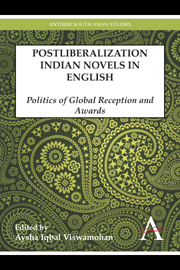Book contents
- Frontmatter
- Dedication
- Contents
- Acknowledgements
- Foreword
- Introduction
- 1 A Maverick Scholar: The Writings of Pankaj Mishra
- 2 Commodification of Post-Rushdie Indian Novels in English: Kunal Basu and the Politics of Decanonization
- 3 Marketing Lad Lit, Creating Bestsellers: The Importance of Being Chetan Bhagat
- 4 Vikas Swarup: Writing India in Global Time
- 5 The God of Small Things: Arundhati Roy's ‘Made in India’ Bookerboiler
- 6 Aravind Adiga: The White Elephant? Postliberalization, the Politics of Reception and the Globalization of Literary Prizes
- 7 ‘The Multinational's Song’: The Global Reception of M. G. Vassanji
- 8 ‘Shreds of Indianness’: Identity and Representation in Manju Kapur's The Immigrant
- 9 Inside ‘The Temple of Modern Desire’: Recollecting and Relocating Bombay
- 10 Tabish Khair: Marketing Compulsions and Artistic Integrity
- 11 Rohinton Mistry and the Canlit Imperative
- 12 Amitav Ghosh: The Indian Architect of a Postnational Utopia
- 13 Here, There and Everywhere: Vikram Seth's Multiple Literary Constituencies
- 14 Whatever Happened to Kaavya Viswanathan?
- 15 Of Win and Loss: Kiran Desai's Global Storytelling
- 16 Immigrant Desires: Narratives of the Indian Diaspora by Chitra Banerjee Divakaruni
- Glossary of Indian Words
- List of Contributors
- Bibliography
- Index
6 - Aravind Adiga: The White Elephant? Postliberalization, the Politics of Reception and the Globalization of Literary Prizes
Published online by Cambridge University Press: 05 July 2013
- Frontmatter
- Dedication
- Contents
- Acknowledgements
- Foreword
- Introduction
- 1 A Maverick Scholar: The Writings of Pankaj Mishra
- 2 Commodification of Post-Rushdie Indian Novels in English: Kunal Basu and the Politics of Decanonization
- 3 Marketing Lad Lit, Creating Bestsellers: The Importance of Being Chetan Bhagat
- 4 Vikas Swarup: Writing India in Global Time
- 5 The God of Small Things: Arundhati Roy's ‘Made in India’ Bookerboiler
- 6 Aravind Adiga: The White Elephant? Postliberalization, the Politics of Reception and the Globalization of Literary Prizes
- 7 ‘The Multinational's Song’: The Global Reception of M. G. Vassanji
- 8 ‘Shreds of Indianness’: Identity and Representation in Manju Kapur's The Immigrant
- 9 Inside ‘The Temple of Modern Desire’: Recollecting and Relocating Bombay
- 10 Tabish Khair: Marketing Compulsions and Artistic Integrity
- 11 Rohinton Mistry and the Canlit Imperative
- 12 Amitav Ghosh: The Indian Architect of a Postnational Utopia
- 13 Here, There and Everywhere: Vikram Seth's Multiple Literary Constituencies
- 14 Whatever Happened to Kaavya Viswanathan?
- 15 Of Win and Loss: Kiran Desai's Global Storytelling
- 16 Immigrant Desires: Narratives of the Indian Diaspora by Chitra Banerjee Divakaruni
- Glossary of Indian Words
- List of Contributors
- Bibliography
- Index
Summary
[Prizes] like the Booker [might] be seen to operate to some extent at least as what Frederic Jameson calls ‘strategies of containment’ […] for the redirecting of oppositional energies into the mainstream of Western metropolitan cultural thought.
(Graham Huggan, The Postcolonial Exotic)Instead of confirming the victory of reform, the awarding of the Nobel Prize in literature to authors from Columbia, Egypt, South Africa, Nigeria, Mexico, Saint Lucia, and Afro-America in an almost unbroken succession in the 1980s and early 1990s gave ongoing lessons in the varieties of containment, and it is here that sublimation and cosmopolitanism have been largely identical.
(Timothy Brennan, At Home in the World)Standing around books, even books in a foreign language, you feel a kind of electricity buzzing up towards you […]. It just happens, the way you get erect around girls wearing tight jeans. Except here what happens is that your brain starts to hum.
(Aravind Adiga, The White Tiger)Set against a backdrop of celebrity authors and big budget book clubs, the global literary prize safari has arguably never been as high profile. With the international credit crisis still crunching, many multinational corporations continue to promote their more ‘people-friendly’ sides by investing in artistic awards. If the benefits of such associations are hard to quantify, they are multifarious. Yet, as Huggan and Brennan point out above, certain socioeconomic – and arguably political – imperatives bubble beneath the surface of such cultural largesse. The resonant qualifying term linking both epigraphs is ‘containment’.
- Type
- Chapter
- Information
- Postliberalization Indian Novels in EnglishPolitics of Global Reception and Awards, pp. 51 - 66Publisher: Anthem PressPrint publication year: 2013



